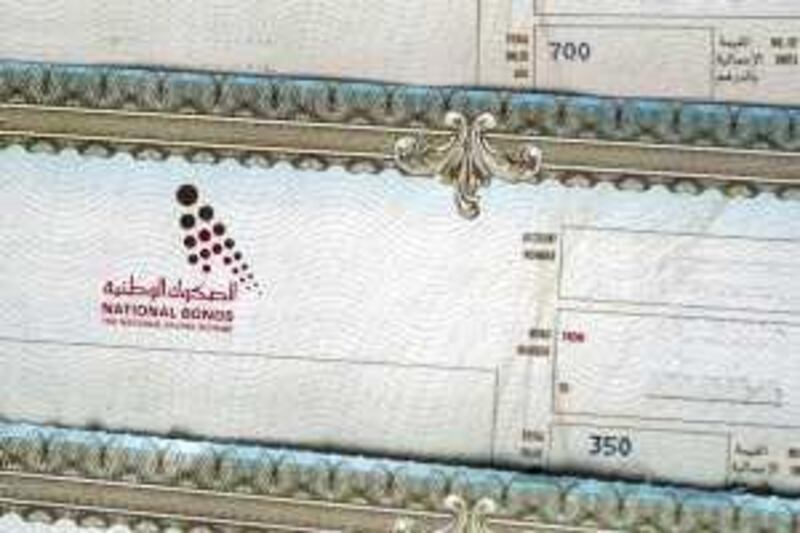One morning this week, Mohammed Thousif drove with a friend to Abu Dhabi's Marina Mall. Not to spend, but to save. Mr Thousif, who is 26, is from southern India and has lived for six months in Abu Dhabi, where he works in public relations. He is getting married in July and went to Al-Ansari Exchange in the basement of the mall to purchase some National Bonds. The bonds represent the beginning of his savings for the future. He said a friend told him about National Bonds and he plans to create a stockpile in the months, if not years, to come. "I think that it is safe," he said. "I hope so."
Thousands of others in the region share his hope, given that the National Bonds Corporation has delayed its profit announcement for 2009. That has raised the possibility that the bonds many perceived as completely safe actually carry hidden risks. National Bonds is the Sharia-compliant savings scheme launched in 2006 by the Dubai-based company of the same name. The company is backed by the Dubai government, which owns 50 per cent of the firm, with the remaining shares equally split between Dubai Bank, Dubai Holding and Emaar Properties.
The scheme has been extremely successful, with the company saying last year that it now had more half a million bondholders. The minimum purchase is Dh100, and the bonds cost Dh10 each. The surface appeal is the monthly drawing, in which one lucky bondholder is awarded a Dh1 million prize (US$267,300). There are a number of other draws with smaller prizes as well. The prizes were designed as a lure to encourage saving among consumers in the region, described as the broader goal for the scheme. As a secondary attraction, the company promised to return at least 20 per cent of investment profits to bondholders (the remainder is distributed to the company's shareholders).
But it turned out those returns were lucrative as well - 6.3 per cent in 2007 and 7.07 per cent in 2008, far beyond the returns available in standard savings accounts. Other countries, including Britain, offer similar prize-linked schemes, but investment returns are typically minimal because deposits are fully guaranteed. That is not the case with National Bonds. Under Sharia law, everyone shares profits and losses equally.
In previous years, National Bonds announced profits in January. As of Thursday, it had still not released its 2009 results. A statement on the company's website says results will be "announced shortly" and notes that there is no fixed or mandatory date for profits to be announced. National Bonds did not return calls for comment this week. The worries about 2009 numbers are rooted in the fact that a portion of the deposits were invested in troubled property developments in Dubai. The company's flagship project, the Dh1.5 billion Skycourts, sold out in 2006 but is now delayed for at least another year. A second project, Flamingo Creek at the Lagoons, is suspended indefinitely.
The company has said its deposits are invested conservatively. And, indeed, there remains the possibility that its other investments could outperform the market, enabling the company to match or even exceed the returns from previous years. The company is an active private equity investor and owns stakes in other businesses, including a shopping chain called Souq Extra. Still, financial advisers say the uncertainty over the bonds reveals a powerful lesson in personal finance: where there are impressive returns, there is always at least a degree of risk. But many bondholders are not aware that the deposits are not guaranteed.
Mr Thousif said he was told his money was safe but acknowledged that he did not know precisely where it would be invested. "The key thing is that people understand where their money is invested and accept the potential risks that go along with it," said Neil Flanagan, a senior consultant with Acuma Wealth Management in Dubai. Mr Flanagan said he did not discourage clients from buying the bonds, but advises them to include them as part of a diversified portfolio. "Any investment portfolio should have a mixture of different asset classes," he said.
"I certainly wouldn't encourage anyone to have all of their life savings in any one asset class." Mr Flanagan noted that even though the bonds were liquid - that is, they can theoretically be redeemed at any time - consumers should not consider them as their only emergency fund, to draw on in a crisis. They should instead keep a small cash balance available for that purpose. This advice is particularly important, as National Bonds has broadened its appeal of late, adding an employee savings component that allows employees to have a percentage of their regular paychecks set aside for bond purchases. The company also provides a Takaful life insurance cover for all bondholders.
For those who like the concept of a prize-linked savings scheme but are uncomfortable with investment risk, Mashreq Bank offers what it calls the "Mashreq Millionaire certificates" for Dh1,000 (US$267) apiece. Anyone who owns at least 10 of the certificates is eligible for an annual drawing - in June this year - awarding Dh10 million (US$2.67million). The big difference between that programme and National Bonds is that Mashreq deposits are not subject to any profits or losses. At redemption, the customer only receives the amount of his or her initial deposit - no more and no less.
Of course, anyone who had gone that route would have missed out on the enviable returns collected by National Bonds customers over the past two years. The question now is whether those will continue. "We're all watching and waiting to see what numbers they are going to come up with," Mr Flanagan said. @Email:breagan@thenational.ae






